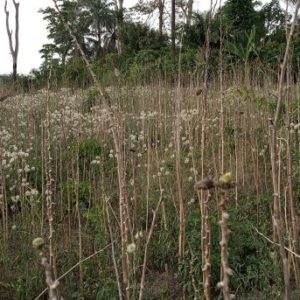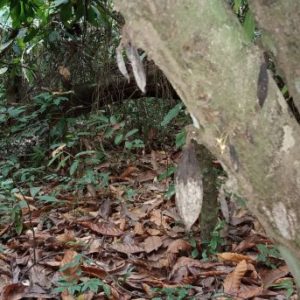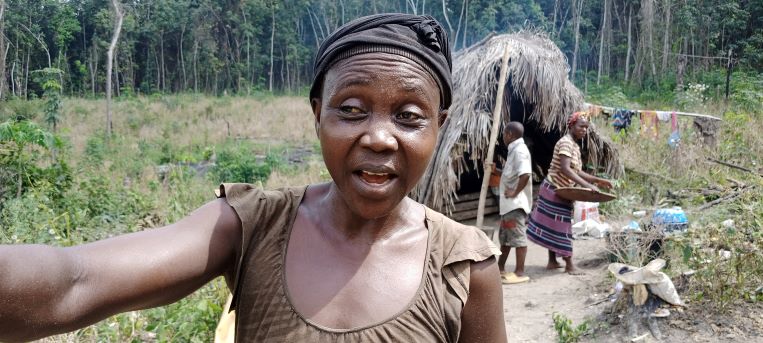PHOTO: Musu Sumo a farmer in Bong County says climate change has devastated her family
By Evelyn Kpadeh Seagbeh
SINYEA, BONG COUNTY, Liberia – After two years of poor harvests, the Sumo family was nervous this year. Rain had been unpredictable. The sun felt hotter. The soil on their five-hectare plot here was dry. They planted bitter ball, pumpkin, pepper, corn, okra and rice and followed the rules they had followed their whole lives as subsistence farmers.
But again their harvest was a disaster.
“The sun ray is not easy this year, it’s too much, even if you water the crops it can’t still make it,” Musu Sumo said. “The corn and pumpkin we planted in the rice, nothing came up. They all left short-short and died.”
To make up for the lost rain, the Sumos dug pit wells around the farms to bring water to the crops morning and evening. It was hard work, but even that was not enough. The rice they planted last year has gone long before the end of the season. Where once they would have 25 bags of rice from their harvest, this year, they have just five. The family will be forced to buy imported rice.
“Farming nowadays is like a waste of time and resources, “said Sam Sumo, Musu’s husband. “We work hard, investing money in the work, but we get far less and for us farming is our life. We are confused now and don’t know what to do.”
Climate change is wreaking havoc on Liberia’s farmers. As many as 80% of the population depend on subsistence farming. Seventy per cent of jobs are tied to agricultural exports – rubber, coffee, palm oil, sugar and cocoa. Climate change is threatening to send Liberia into a food security crisis, according to leading climate change expert Jerome Nyenka.
“The coming and the end of rain have changed. We don’t know when the sunshine will start and when it will end,” said Professor Nyenka, the University of Liberia professor and former executive director of the Environmental Protection Agency. “Farmers are losing their source of survival. Now that climate change is set in its making it hard for them to grow their crops. So they don’t have enough to eat, much less to sell. If you can’t find food to eat how do you pay for your children’s school fees? How do you buy medicine for yourself and your family members?”
Ezekiel Yarkpawolo, 42, said 2020 and 2021 have been the worst farming seasons he has experienced in 10 years of farming. The inconsistency in weather has cost him badly.
“In 2020 I credited $LD30, 000 from a financial saving club to invest into the soil and I planted bitter ball and other vegetables,” Mr. Yarkpawolo said. “But the sun killed everything immediately after they sprouted. I lost so badly and was indebted to the club, so I had to appeal to the club that I pay that money back piece meal. We are really suffering.”
Because women carry the biggest burden in food and water collection, climate change is falling most heavily on them.

An okra farm in Palala, leafs all dry just one month into harvest
“You can see all around us, woman like me was making bitter ball and okra farms to enable me harvest and earn some good money, but there was no way, I lost,” said an emotional Musu. “I’m frustrated! You work like that to get nothing! Not even rest a day. It will make you to not feel fine. I am appealing to the government to help us the farmers or bring work.”
From wildfires in California and Australia, to flooding in Asia and heatwaves in Europe climate change is devastating people across the globe. But in poor countries like Liberia there is no money to invest in infrastructure, adaptation and technology that can help people adjust.
Developed countries have committed $US100bn a year on climate change adaptation in developing countries. The Liberian government has proposed a $US490.5m adaptation plan that will focus on six climate-sensitive sectors – agriculture, coastal resources, energy, fisheries, forestry and waste. It has committed to funding 15 percent itself; the other 85 percent will come from donors. To unlock those funds the government must submit acceptable proposals. International donors told New Narratives the recent anti-corruption investigation into the Agriculture Ministry will not help.
A recently announced $US9.5 million dollar project, backed by the International Fund for Agriculture Development, will target 250,000 smaller holder farmers, including 10,000 rice producers, 10,000 cocoa producers and 5,000 smallholder farmers with 40% going to women.
“Beyond that, the government is also thinking of bringing in a financial institution similar to what the Agriculture Bank was to make sure farmers have access to funding that they can borrow, grow their farms and pay back,” said Wilson Tarpeh, the chief executive of the Environmental Protection Authority. “The government is not only thinking, but also doing something about the impacts of climate change on our farmers.”
The help can’t come soon enough for cocoa farmers like James Kerkulah. Here in Seke Ta, Palala District in Bong County, Mr. Kerkulah is one of the many farmers here who don’t know how to manage their crops with the new climate conditions.

Cocoa trees that should be full of pods are bare this season
“We used to harvest our cocoa up to February, but you went into the bush and there’s nothing much on the trees. We keep losing,” Mr. Kerkuleh said.
In the last three years the cocoa fruit has been dying long before the right harvesting season.
“The level of flowering that is supposed to produce the yield for the cocoa are not much,” said Lassana Tucker, a technician with local NGO, the Vainga Agriculture Development Management Consultancy, which supports 600 local farmers in four counties with training and guidance.
“Because the amount of rain fall that the cocoa needs to get the cocoa bobs are not coming timely. We should have been harvesting up to February, but now it has gone short.”
It has been hard for Mr. Kerkulah and his family.
“My plan 2021 was that after my harvest I would raise around $LD30,000 at least to change the roof of my house to zinc and pay my children school fees. But I never got up to $LD 10,000. We are laboring for nothing.”
Mr. Tucker said some of the farmers he works with have given up on farming cocoa. He finds himself in the difficult situation of having to help them understand climate change is beyond their control.
“They use that money to survive,” he said. “They use that money to take care of their homes, send their children to school and all that. They want to know from us, ‘how are these things happening?’. We try to explain that now, the issue is a global issue.”
Professor Nyenka also expects agriculture exports to be hard hit without major interventions. With 90% of Liberia’s export earnings coming from agriculture that will be a blow to the economy. Because Liberia does not have sophisticated irrigation systems as they do in other countries and depends on rainfall alone, Liberia’s produce will not be able to compete.
“Some crops need more water, some need less. Each crop has a requirement of sunshine, water, humidity so when rain is delayed it will affect the yield from the farm,” said Professor Nyenka. “If the rain is delayed by two or three weeks that means that your crop will not be good. And you will not be able to sell on international markets.”
He says the government will need to make major investments if the industry is to be saved.
For smallholder farmers Professor Nyenka has clear advice:
“Climate change is real. All of us should listen to the international experts, the NGOs, government. There are things they want us to do,” he said.
Nyenka said farmers should mix crops, not depend on one. They should move into animals – piggeries, poultry, cane rats, beekeeping. Animals fertilize the soil. And don’t clear shrubs and trees. Trees, animals are all part of a healthy farming environment.
“Together we fight climate change,” Professor Nyenka warned. “It’s everybody’s business. If one group of people fail to take action, we will all fail.”
This story is a collaboration with New Narratives as part of the Land Rights and Climate Change Reporting Project. Funding was provided by the UK Foreign, Commonwealth and Development Office. The funders’ had no say in the story’s content.

